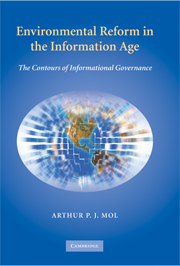2 - From Information Society to Information Age
Published online by Cambridge University Press: 03 November 2009
Summary
The transformation of modern society
In the 1960s and 1970s, the postindustrial society idea was developed by a growing number of respected authors, who started to investigate the discontinuities in modern society. These scholars believed and illustrated that modern society was moving from an industrial society to what they labelled a postindustrial society. According to them, this transformation meant a radical change of the modern order, comparable in magnitude to the transformation of the agricultural society into the industrial society. Publications of the famous Harvard sociologist Daniel Bell (1973, 1976, 1979), and more popular studies such as Future Shock (Alvin Toffler, 1970) and The Age of Discontinuity (Peter Drucker, 1969), started a period of intense and stimulating debate on the future of industrial society and the contours of a new phase of the modern order, markedly different from the heydays of industrialised modernity.
According to Kumar (1995: 2) the debate on the postindustrial society ended more or less with the oil crisis in 1973. From then onwards, the ‘limits to growth’, the containment of industrial capitalism rather than the dynamic potential of industrialism, dominated the debate. With deindustrialisation and economic decline as the main headlines in the newspapers, visions and agendas of a postindustrial society were no longer very attractive. But, at the same time, classic industrialism and industrialisation seemed no longer adequate to characterize Western society as it entered the last quarter of the twentieth century.
- Type
- Chapter
- Information
- Environmental Reform in the Information AgeThe Contours of Informational Governance, pp. 29 - 54Publisher: Cambridge University PressPrint publication year: 2008

